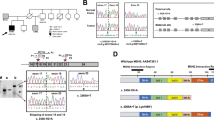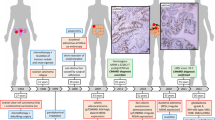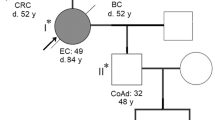Abstract
Mono-allelic germline mutations in mismatch repair (MMR) genes lead to Lynch syndrome, an autosomal dominant syndrome with an increased risk of predominantly colorectal and endometrial cancers. Bi-allelic germline mutations in MMR genes predispose to haematological malignancies, brain tumours, gastrointestinal tumours, polyposis and features of neurofibromatosis type 1 in early childhood.
We report a brother and a sister with bi-allelic germline mutations in MSH2; a pathogenic deletion of the first 6 exons and a variant of the initiation codon (c.1A>G (p.Met1?)), whereas their phenotypes (four colorectal cancers, small bowel carcinoma and 15 adenomas at age 39 and 48, and colorectal cancer, endometrial cancer and four adenomas at age 33 and 44, respectively) are more suggestive of a mono-allelic pathogenic MMR gene mutation. The carcinomas showed microsatellite instability in the presence of MLH1, PMS2, MSH2 and MSH6 proteins, indicating that the variant c.1A>G leads to an alternative protein with reduced activity that is retained in the tumours.
Our data suggest that the MSH2 variant c.1A>G (p.Met1?) should not be considered as a regular pathogenic mutation that leads to a strongly increased cancer risk, though it possibly contributes to a more severe phenotype when combined with a truncating mutation on the other allele.
Similar content being viewed by others
Log in or create a free account to read this content
Gain free access to this article, as well as selected content from this journal and more on nature.com
or
References
Lynch HT, de la Chapelle A : Hereditary colorectal cancer. N Engl J Med 2003; 348: 919–932.
Felton K, Gilchrist D, Andrew S : Constitutive deficiency in DNA mismatch repair. Clin Genet 2007; 71: 483–498.
Bougeard G, Charbonnier F, Moerman A et al: Early onset brain tumor and lymphoma in MSH2-deficient children. Am J Hum Genet 2003; 72: 213–216.
De Rosa M, Fasano C, Panariello L et al: Evidence for a recessive inheritance of Turcot's syndrome caused by compound heterozygous mutations within the PMS2 gene. Oncogene 2000; 19: 1719–1723.
De Vos M, Hayward BE, Picton S, Sheridan E, Bonthron DT : Novel PMS2 pseudogenes can conceal recessive mutations causing a distinctive childhood cancer syndrome. Am J Hum Genet 2004; 74: 954–964.
Hamilton SR, Liu B, Parsons RE et al: The molecular basis of Turcot's syndrome. N Engl J Med 1995; 332: 839–847.
Ostergaard JR, Sunde L, Okkels H : Neurofibromatosis von Recklinghausen type I phenotype and early onset of cancers in siblings compound heterozygous for mutations in MSH6. Am J Med Genet A 2005; 139: 96–105.
Trimbath JD, Petersen GM, Erdman SH, Ferre M, Luce MC, Giardiello FM : Cafe-au-lait spots and early onset colorectal neoplasia: a variant of HNPCC? Fam Cancer 2001; 1: 101–105.
Whiteside D, McLeod R, Graham G et al: A homozygous germ-line mutation in the human MSH2 gene predisposes to hematological malignancy and multiple cafe-au-lait spots. Cancer Res 2002; 62: 359–362.
Will O, Carvajal-Carmona LG, Gorman P et al: Homozygous PMS2 deletion causes a severe colorectal cancer and multiple adenoma phenotype without extraintestinal cancer. Gastroenterology 2007; 132: 527–530.
Wang Q, Montmain G, Ruano E et al: Neurofibromatosis type 1 gene as a mutational target in a mismatch repair-deficient cell type. Hum Genet 2003; 112: 117–123.
Edelmann L, Edelmann W : Loss of DNA mismatch repair function and cancer predisposition in the mouse: animal models for human hereditary nonpolyposis colorectal cancer. Am J Med Genet C Semin Med Genet 2004; 129: 91–99.
Felton K, Gilchrist D, Andrew S : Constitutive deficiency in DNA mismatch repair: is it time for Lynch III? Clin Genet 2007; 71: 499–500.
Hoogerbrugge N, Willems R, Van Krieken HJ et al: Very low incidence of microsatellite instability in rectal cancers from families at risk for HNPCC. Clin Genet 2003; 63: 64–70.
Boland CR, Thibodeau SN, Hamilton SR et al: A National Cancer Institute Workshop on Microsatellite Instability for cancer detection and familial predisposition: development of international criteria for the determination of microsatellite instability in colorectal cancer. Cancer Res 1998; 58: 5248–5257.
Kozak M : Point mutations define a sequence flanking the AUG initiator codon that modulates translation by eukaryotic ribosomes. Cell 1986; 44: 283–292.
Mangold E, Pagenstecher C, Friedl W et al: Tumours from MSH2 mutation carriers show loss of MSH2 expression but many tumours from MLH1 mutation carriers exhibit weak positive MLH1 staining. J Pathol 2005; 207: 385–395.
Overbeek LI, Kets CM, Hebeda KM et al: Patients with an unexplained microsatellite instable tumour have a low risk of familial cancer. Br J Cancer 2007; 96: 1605–1612.
Lamers MH, Perrakis A, Enzlin JH, Winterwerp HH, de WN, Sixma TK : The crystal structure of DNA mismatch repair protein MutS binding to a G x T mismatch. Nature 2000; 407: 711–717.
Kets CM, van Krieken JH, Hebeda KM et al: Very low prevalence of germline MSH6 mutations in hereditary non-polyposis colorectal cancer suspected patients with colorectal cancer without microsatellite instability. Br J Cancer 2006; 95: 1678–1682.
Buhard O, Suraweera N, Lectard A, Duval A, Hamelin R : Quasimonomorphic mononucleotide repeats for high-level microsatellite instability analysis. Dis Markers 2004; 20: 251–257.
Wagner A, Barrows A, Wijnen JT et al: Molecular analysis of hereditary nonpolyposis colorectal cancer in the United States: high mutation detection rate among clinically selected families and characterization of an American founder genomic deletion of the MSH2 gene. Am J Hum Genet 2003; 72: 1088–1100.
Farrington SM, Lin-Goerke J, Ling J et al: Systematic analysis of hMSH2 and hMLH1 in young colon cancer patients and controls. Am J Hum Genet 1998; 63: 749–759.
Barnetson RA, Tenesa A, Farrington SM et al: Identification and survival of carriers of mutations in DNA mismatch-repair genes in colon cancer. N Engl J Med 2006; 354: 2751–2763.
Otway R, Tetlow N, Hornby J, Kohonen-Corish M : Evaluation of enzymatic mutation detection trade mark in hereditary nonpolyposis colorectal cancer. Hum Mutat 2000; 16: 61–67.
Author information
Authors and Affiliations
Corresponding author
Rights and permissions
About this article
Cite this article
Kets, C., Hoogerbrugge, N., van Krieken, J. et al. Compound heterozygosity for two MSH2 mutations suggests mild consequences of the initiation codon variant c.1A>G of MSH2. Eur J Hum Genet 17, 159–164 (2009). https://doi.org/10.1038/ejhg.2008.153
Received:
Revised:
Accepted:
Published:
Issue date:
DOI: https://doi.org/10.1038/ejhg.2008.153
Keywords
This article is cited by
-
Elucidating the clinical significance of two PMS2 missense variants coexisting in a family fulfilling hereditary cancer criteria
Familial Cancer (2017)
-
Mutation spectrum of and founder effects affecting the PTS gene in East Asian populations
Journal of Human Genetics (2012)



